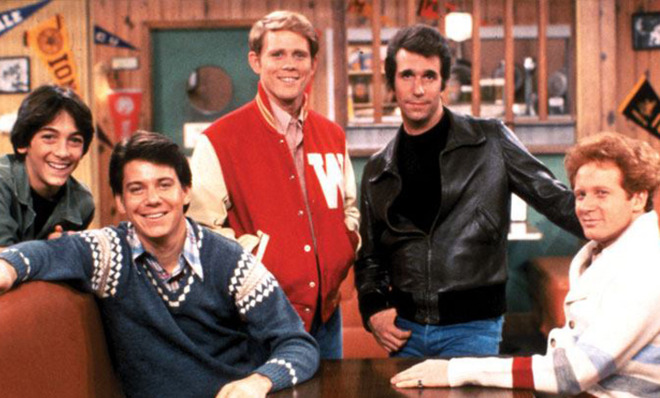7 things the world's happiest people do every day
Make time with friends mandatory

A free daily email with the biggest news stories of the day – and the best features from TheWeek.com
You are now subscribed
Your newsletter sign-up was successful

University of California professor Sonja Lyubomirsky details the things research shows the happiest people have in common.
1. They devote a great amount of time to their family and friends, nurturing and enjoying those relationships.
2. They are comfortable expressing gratitude for all they have.
3. They are often the first to offer helping hands to coworkers and passersby.
4. They practice optimism when imagining their futures.
5. They savor life's pleasures and try to live in the present moment.
6. They make physical exercise a weekly and even daily habit.
7. They are deeply committed to lifelong goals and ambitions (e.g., fighting fraud, building cabinets, or teaching their children their deeply held values).
8. Last but not least, the happiest people do have their share of stresses, crises, and even tragedies. They may become just as distressed and emotional in such circumstances as you or I, but their secret weapon is the poise and strength they show in coping in the face of challenge. [The How of Happiness]
I guess the blog post could end here. You've got your answer. But did you just want trivia? Or do you actually want to get happier?
The internet has become a firehose of ideas we never implement, tricks we forget to use.
The Week
Escape your echo chamber. Get the facts behind the news, plus analysis from multiple perspectives.

Sign up for The Week's Free Newsletters
From our morning news briefing to a weekly Good News Newsletter, get the best of The Week delivered directly to your inbox.
From our morning news briefing to a weekly Good News Newsletter, get the best of The Week delivered directly to your inbox.
Reading a list of things is easy. Implementing them in your life can be hard. But it doesn't have to be. Let's get down to business.
"Happiness Subscriptions"
Here's an interesting fact about happiness: frequency beats intensity. What's that mean?
Lots of little good things make you happier than a handful of big things.
A free daily email with the biggest news stories of the day – and the best features from TheWeek.com
Research shows that going to church and exercising both bring people a disproportionate amount of happiness. Why?
They give us frequent, regular boosts.
Stanford professor Jennifer Aaker says it's really that simple: the things that make you happy, do them more often.
We have designated work hours. We schedule doctor appointments. Heck, we even schedule hair appointments. We say happiness is the most important thing but fail to consistently include it in our calendars.
Research shows 40 percent of happiness is due to intentional activity. You can change your happiness by up to 40 percent by what you choose to do every day.
And much of what you do, you do on autopilot. Forty percent of what you do every day isn't the result of decisions, it's due to habits.
One paper published by a Duke University researcher in 2006 found that more than 40 percent of the actions people performed each day weren't actual decisions, but habits. [The Power of Habit: Why We Do What We Do in Life and Business]
See where I'm going with this?
Happy things need to be a habit. Part of your routine. Part of your schedule. Stop waiting for random happy events: you need a "happiness subscription."
So how do we take that list and make them things we actually do every day instead of more forgotten trivia? Let's get started.
1) Wake up and say ARG!
Even scientific happiness advice is often corny. I'll say that now so we can get it off the table…. But it works.
And this is why you might want to say ARG when you wake up. It's an acronym that stands for:
1. Anticipation2. Recollection3. Gratitude
I've written about the importance of a morning ritual and how research shows your mood in the morning affects your entire day. So start right.
Anticipation is a powerful happiness booster. It's two for the price of one: You get the good thing and you get happy in anticipation of the good thing.
So think about what you're looking forward to. Got nothing you're looking forward to? Schedule something.
Recollecting great moments has a related effect. Memories allow us to relive the good times and kill stress.
People prone to joyful anticipation, skilled at obtaining pleasure from looking forward and imagining future happy events, are especially likely to be optimistic and to experience intense emotions. In contrast, those proficient at reminiscing about the past — looking back on happy times, rekindling joy from happy memories — are best able to buffer stress. [The How of Happiness]
And gratitude is arguably the king of happiness. What's the research say? Can't be more clear than this:
…the more a person is inclined to gratitude, the less likely he or she is to be depressed, anxious, lonely, envious, or neurotic. [The How of Happiness]
And the combo often leads to optimism. Another powerful predictor of happiness.
So, corny as it may be, wake up and say ARG! And then do a quick bit of anticipation, recollection, and gratitude.
(For more on optimism click here.)
All that's fine and dandy. But what do you do once you're out of bed?
2) Savor your morning coffee

Take a moment and really enjoy it. Smell it. Taste it. Appreciate it. Corny? Maybe.
But other research shows savoring — appreciating the good moments – is what separates the happiest people from the average Joe.
I imagine some of you are saying, "Well, I don't drink coffee." And please imagine me saying, "That's not the point."
It can be anything you do every morning.
And embedding savoring in our little daily rituals is powerful because studies show rituals matter.
Here's Harvard professor Francesca Gino:
You can think about rituals that you yourself might engage in prior to consumption experiences. What they do, they make us a little bit more mindful about the consumption experience that we are about to have. Because of that, we end up savoring the food or whatever we are drinking more, we enjoy the experience more, and in fact, we're also more willing to pay higher prices for whatever it is that we just consumed. Once again, rituals are beneficial in the sense that they create higher levels of enjoyment in the experience that we just had.
(For more on how savoring can make you happier click here.)
So what other habit can we build into our schedule that boosts joy? How about one that can make you as happy as sex does?
3) Sweat your way to joy
When you study people to see what makes them happiest you get three answers: sex, socializing, and exercise.
Their findings confirm what had been found previously: happiness is high during sex, exercise, or socializing, or while the mind is focused on the here and now, and low during commuting or while the mind is wandering. [Engineering Happiness: A New Approach for Building a Joyful Life]
People who exercise are, across the board, mentally healthier: less depression, anger, stress, and distrust.
A massive Dutch study of 19,288 twins and their families published in 2006 showed that exercisers are less anxious, less depressed, less neurotic, and also more socially outgoing. A Finnish study of 3,403 people in 1999 showed that those who exercise at least two to three times a week experience significantly less depression, anger, stress, and "cynical distrust" than those who exercise less or not at all. [Spark: The Revolutionary New Science of Exercise and the Brain]
Don't like exercise? Then you're doing the wrong kind.
Running, lifting weights, playing any sport… Find something you enjoy that gets you moving.
(For more on how sweating can increase smiling — and make you smarter too — click here.)
Okay, time to head to work. What's the best thing to do when you start the day? It's not about you — but it will make you happier.
4) The five minute favor
Who lives to a ripe old age? Not those who get the most help, ironically it's those who give the most help.
We figured that if a Terman participant sincerely felt that he or she had friends and relatives to count on when having a hard time then that person would be healthier. Those who felt very loved and cared for, we predicted, would live the longest. Surprise: our prediction was wrong… Beyond social network size, the clearest benefit of social relationships came from helping others. Those who helped their friends and neighbors, advising and caring for others, tended to live to old age. [The Longevity Project: Surprising Discoveries for Health and Long Life from the Landmark Eight-Decade Study]
And a great way to do that without taking up too much time is Adam Rifkin's "5 Minute Favor":
Every day, do something selfless for someone else that takes under five minutes. The essence of this thing you do should be that it makes a big difference to the person receiving the gift. Usually these favors take the form of an introduction, reference, feedback, or broadcast on social media.
So take five minutes to do something that is minor for you but would provide a big benefit to someone else. It's good karma — and science shows that, in some ways, karma is quite real.
Yes, some who do a lot for others get taken advantage of. But as Adam Grant of Wharton has shown, givers also succeed more:
Then I looked at the other end of the spectrum and said if Givers are at the bottom, who's at the top? Actually, I was really surprised to discover, it's the Givers again. The people who consistently are looking for ways to help others are over-represented not only at the bottom, but also at the top of most success metrics.
(For more on the best way to get happier by being a giver, click here.)
Alright, you have to start work for the day. Ugh. But there are ways that work can make you happier too.
5) Life is a game, and so is work
Like the research shows, the happiest people have goals.
In his studies, the psychologist Jonathan Freedman claimed that people with the ability to set objectives for themselves — both short-term and long-term — are happier. The University of Wisconsin neuroscientist Richard Davidson has found that working hard toward a goal and making progress to the point of expecting a goal to be realized don't just activate positive feelings — they also suppress negative emotions such as fear and depression. [Engineering Happiness: A New Approach for Building a Joyful Life]
Many of us feel like work can be boring or annoying but the research shows many of us are actually happier at work than at home. Why?
Challenges. And we reach that state of "flow" only when a challenge presents itself. So how can work make us happier?
Three research-backed things to try:
1. To the degree you can, do things you're good at. We're happier when we exercise our strengths.2. Make note of your progress. Nothing is more motivating than progress.3. Make sure to see the results of your work. This gives meaning to most any activity.
(For more on getting happier by setting goals click here.)
Enough work. You've got some free time. But what's the happiest way to use your free time?
6) Friends get appointments too

You have mandatory meetings in your schedule but not mandatory time with friends? Absurd.
One study says that as much as 70 percent of happiness comes from your relationships with other people.
Contrary to the belief that happiness is hard to explain, or that it depends on having great wealth, researchers have identified the core factors in a happy life. The primary components are number of friends, closeness of friends, closeness of family, and relationships with co-workers and neighbors. Together these features explain about 70 percent of personal happiness. – Murray and Peacock 1996 [The 100 Simple Secrets of Happy People]
Why does church make people so happy? Studies show it has nothing to do with religion — it's about the socializing. It's scheduled friend time.
After examining studies of more than three thousand adults, Chaeyoon Lin and Robert Putnam found that what religion you practice or however close you feel to God makes no difference in your overall life satisfaction. What matters is the number of friends you have in your religious community. Ten is the magic number; if you have that many, you'll be happier. Religious people, in other words, are happier because they feel connected to a community of like-minded people. [The Secrets of Happy Families: Improve Your Mornings, Rethink Family Dinner, Fight Smarter, Go Out and Play, and Much More]
And if you have the cash, pay for dinner with a friend. Money definitely can make you happier — when you spend it on other people.
By the end of the day, individuals who spent money on others were measurably happier than those who spent money on themselves — even though there were no differences between the groups at the beginning of the day. And it turns out that the amount of money people found in their envelopes — $5 or $20 — had no effect on their happiness at the end of the day. How people spent the money mattered much more than how much of it they got. [Happy Money: The Science of Smarter Spending]
Harvard professor and author of Happy Money: The Science of Smarter Spending, Michael Norton explains in his TED talk:
Don't have the cash for that? No problem. Take turns paying. Duke professor Dan Ariely says this brings more happiness than always paying half.
(For more on how to have happy friendships click here.)
What's the final thing happy people have in common? They cope with adversity. So what should we do when life gets tough?
7) Find meaning in hard times
Research shows that a happy life and a meaningful life are not necessarily the same thing.
It's hard to be happy when tragedy strikes. But who lives longer and fares better after problems? Those who find benefit in their struggles.
For example, in one study researchers interviewed men who had had heart attacks between the ages of 30 and 60. Those who perceived benefits in the event seven weeks after it happened — for example, believing that they had grown and matured as a result, or revalued home life, or resolved to create less hectic schedules for themselves — were less likely to have recurrences and more likely to be healthy eight years later. In contrast, those who blamed their heart attacks on other people or on their own emotions (e.g., having been too stressed) were now in poorer health. [The How of Happiness]
In many cases, Nietzsche was right: what does not kill us can make us stronger.
A substantial number of people also show intense depression and anxiety after extreme adversity, often to the level of PTSD, but then they grow. In the long run, they arrive at a higher level of psychological functioning than before… In a month, 1,700 people reported at least one of these awful events, and they took our well-being tests as well. To our surprise, individuals who'd experienced one awful event had more intense strengths (and therefore higher well-being) than individuals who had none. Individuals who'd been through two awful events were stronger than individuals who had one, and individuals who had three— raped, tortured, and held captive for example — were stronger than those who had two. [Flourish: A Visionary New Understanding of Happiness and Well-being]
So when you face adversity, always ask what you can learn from it.
(For more on how to make your life more meaningful — without terrible tragedy — click here.)
See that? I took the eight things happy people do and squeezed them into just seven habits. You can thank me later.
Now how do we tie all of these happiness boosters together?
SUM UP
If you want every day to be happier try including these seven things in your schedule:
1. Wake up and say ARG!2. Savor your morning coffee3. Sweat your way to joy4. Do a five minute favor5. Make work a game6. Friends get appointments too7. Find meaning in hard times
We're all quick to say happiness is the most important thing… and then we schedule everything but the things that make us happiest. Huh?
So what's going to make you happy today? Have you thought about it? Is it on your calendar?
Reading happiness information is useless trivia unless you use it and you won't use it unless it's part of your routine.
If happiness is the most important thing then make it the most important thing.
Join 85K+ readers. Get a free weekly update via email here.
More from Barking Up The Wrong Tree...